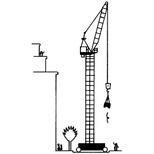The first summer I was old enough to work, Jacques Michaud opened the alpine slide. The slide was ten miles from the lake, in the mountains. Over the years, various businessmen had leased it for a summer or two and failed to make it a success. But Jacques Michaud was from Canada, and maybe he thought that made a difference. Or maybe he hadn’t heard or believed the stories of previous failures, or maybe he thought the economy had changed. At least that was what he said when he hired us, and the economists were saying it, too.
Originally, the place had been a ski area. Thus the lodge: a low, flat, brown-shingled building, and the chairlift, a forty-year-old contraption with shiny red metal slats for seats. The lodge was in a grassy valley and the mountain was covered with pines. It was beautiful. But the peak wasn’t the highest in the state, and the slopes weren’t the steepest. Sometimes people came from Massachusetts to ski, but mostly they drove right past, headed farther north, to the White Mountains.
After the ski area had gone bankrupt, someone saw the abandoned lodge and lift and decided to lay down the alpine slide, two parallel tracks, each a mile long, that began near the top of the chairlift and wound their way down the mountain through the trees, twisting and dipping over spills of glacial rock until they shot out into the flat fields of the valley. The sleds were plastic and had two steel runners on the bottom. When the brakes were all the way off they could go thirty miles an hour, slipping up the high sides on the curves and lifting slightly from the track on the dips. The ride was two minutes long, and you flew down the mountain as you flew in dreams, through seemingly solitary woods that leaned in of their own accord to block out the blue above. It was unforgettable, beyond your control, and you believed you were about to die.
People always said the ride was wonderful, but they also forgot that it existed.
In the late seventies, a businessman made the place into a theme park by adding a waterslide. He put a cafeteria in the lodge, a snack shop by the lift, and constructed a craft village—a row of six chalet-style huts where local artisans sold landscape paintings, goddesses carved from driftwood, and candles shaped like frogs. When that park failed, another businessman made a better park by adding the Cannonball, a man-size tunnel that you slid through until you were shot out into a pool. The fibreglass tube scratched your ass, and the water that sprinkled down from above made you feel as if you were drowning. The ride was seven seconds long, uncomfortable, and without danger or pleasure, but women’s bikini tops sometimes popped off when they hit the pool and, for a while, the Cannonball worked. Then the water park at Bear Beach opened its own Cannonball, and the slide shut down for good.
We had looted it. By we I mean all the local teen-agers, though my own participation was minor and of a different nature, since I lived nearby and considered it mine. Behind my house, there was an old carriage road that went halfway over the mountain, and when I was twelve and thirteen I’d follow it to its dead-end, near the top of the lift, walk down the abandoned slide, and enter the lodge through a broken window. Inside, I took a good look at the cheap white dinnerware and ashtrays scattered around the nubbly blue carpet, tapped my fingers on the stacked-up plastic tables, and inhaled the stink of beer and mildew and the eggy scent of old sex. There were wooden slope signs—“Trigger,” “Splinter,” “Bonebreak,” and “Gunrock”—on the walls, and faded pink maps of the ski area, the mountains, the lake, and the state. But what I liked best was to lie back on the hot slide and stare at the sun. Older kids threw parties in the parking lot at night, made bonfires in the acres of dirt, and had sex in the empty manager’s office amid the mouse turds and dust, but they were never very subtle or quiet and soon after they got there the police would arrive and shoo them away.
Jacques Michaud was only renting the park, but he used his own money to replace the broken windows and repair the lift. He tore up the old nubbly blue carpet and put down a new nubbly blue carpet and restocked the cafeteria with frozen burgers and hot dogs, cases of soda, and industrial sheets of Jell-O and chocolate cake. He whitewashed the bathrooms and shower huts and planted cheap, hardy, orange brushlike flowers all around the park. Then he polished his car, a black 1956 Jaguar Mark VII sedan, and made stops at businesses all around the area, chatting up owners and dropping off batches of shiny purple brochures. Toward the end of this he drove to the Exxon station where my father worked as a mechanic and asked him if he had any kids, preferably daughters, who could work at the slide.
I was fifteen, and a daughter, and my world was circumscribed. I was expected to earn nothing less than A-minuses in school. I ate dinner with my family every night at six and was in bed by ten. I was not allowed to ride in cars with boys. My parents had other rules, all with the same purpose: I could not date, or be alone with a boy. I’d never been kissed. I longed to be kissed. I spent a lot of time at home, in my room. I was also shy, and when I spoke sarcasm came out of my mouth.

























